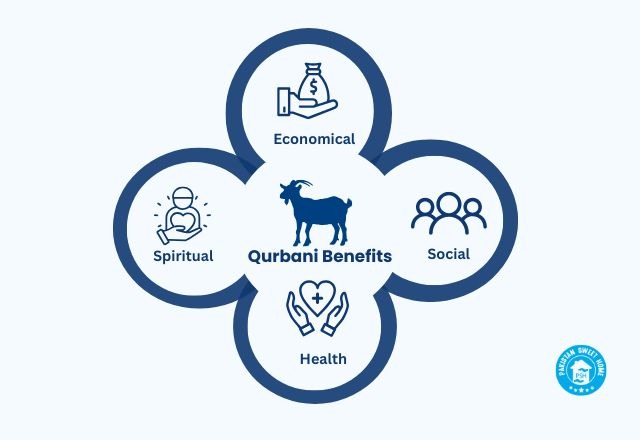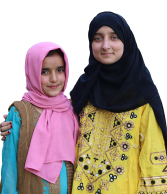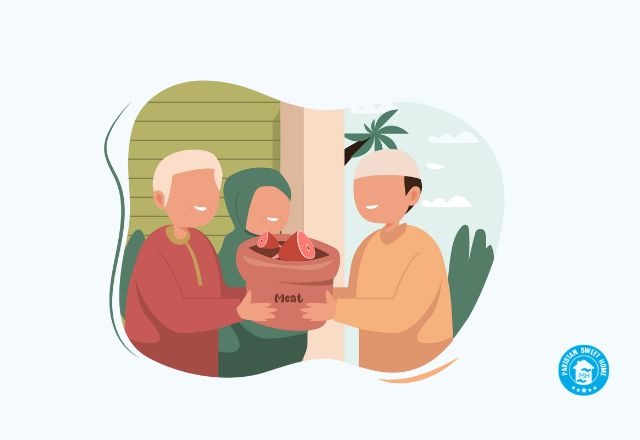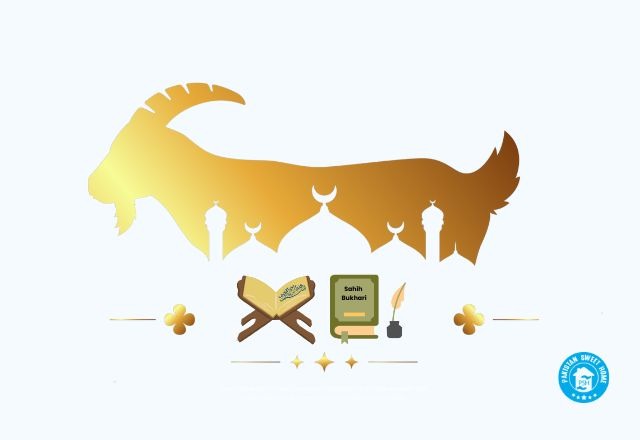You sacrifice an animal every Eid, but do you know what you're truly gaining from it?
So many people fulfill this sacred ritual without realizing the powerful blessings it brings — spiritually, economically, and socially. Without that connection, Qurbani can feel like a duty instead of the life-changing experience it’s meant to be.
The truth is, when done with intention and understanding, the benefits of Qurbani go far beyond the sacrifice itself.
Let’s uncover how this one act brings mercy, unity, and meaning to your life and the lives of others.
Spiritual Benefits of Qurbani
Here are the spiritual Qurbani benefits:
1. Reviving the Sunnah
Qurbani offers us a unique opportunity to revive the Sunnah of Prophet Ibrahim (AS) in the month of Dhul Hijjah. By partaking in this act of sacrifice, an animal, we strengthen our faith and connection to our Creator. Embracing Qurbani allows us to honor this timeless tradition, reaping spiritual rewards and blessings from Allah.
Prophet Muhammad (PBUH) said,
"Whoever revives a Sunnah of mine that dies out after I am gone will indeed have a reward. This reward will be equivalent to that of those who act upon it, without detracting from their reward in the slightest."
(Ibn Majah - 210)
2. Doubling Your Impact and Reward
When you distribute Qurbani meat to the needy, you increase your rewards twofold. It's crucial to remember that every contribution made to the needy not only enriches your present life but also ensures blessings in the Hereafter.
Aisha (may Allah be pleased with her) recounted an incident where they slaughtered a sheep. Upon distributing it, the Prophet Muhammad (PBUH) inquired,
‘What remains?’ She responded, 'Only its shoulder.' He then stated, 'Everything remains intact except its shoulder.'
(Tirmidhi - 2470)
When arranging for your Qurbani, keep in mind that every act of giving serves as an investment in your eternal life. Withholding diminishes your gains just like holding back the shoulder of that sheep.
3. Protecting from Calamity
In times of uncertainty, it becomes particularly crucial to enhance our rewards. The first Qurbani is a duty, while the second one is considered Sadaqah, which is important in times of crisis.
According to a hadith on charity, the Prophet Muhammad (PBUH) advised:
"Give charity quickly, as it acts as a shield against hardship."
(Tirmidhi - 589)
Regardless of the trials or tribulations one faces, extending Sadaqah serves as a shield against calamity. It exemplifies our reliance on Allah and our confidence in His divine plan.
4. Expressing Thankfulness to Allah
Allah Almighty has bestowed upon us countless blessings and invaluable treasures such as faith and obedience. These include the faculties of hearing and sight, wealth, and offspring, among others.
It is imperative to express gratitude for these blessings, as stated in Surah Ibrahim Ayat 7:
"If you are grateful, I will surely increase you [in favor]; but if you deny, indeed, My punishment is severe."
Among the ways to show gratitude to Allah for His blessings is by spending in His cause. One such form of gratitude is through the act of sacrifice.
We thank Allah, recognizing that we are not asked to sacrifice our children, like Prophet Ibrahim (AS) was. Imam Nasafi, citing Ibn Abbas, reported that the sacrifice of Prophet Ismail (AS) was completed. It would have become a Sunnah, and people would have been obligated to sacrifice their children.
Social Benefits of Qurbani
Here are the social benefits of Udhiya/Qurbani:
1. Celebration of One Ummah
In the first 10 days of Dhul Hijjah, through the performance of Hajj and Qurbani, we are reminded of the unity that binds us together as an ummah.
Prophet Muhammad (PBUH) said,
“The believers in their mutual kindness, compassion and sympathy are just like one body. When one of the limbs suffers, the whole body responds to it with wakefulness and fever.”
(Riyad as-Salihin 224)
This Hadith beautifully illustrates the interconnection and empathy that define our collective identity. Just as each part of a body reacts to the pain of another, so too should we.
Our celebration today is not merely a gathering of individuals but a manifestation of our shared spirit. Every smile, every tear, and every act of kindness resonate throughout our community.
2. Upholding the Ties of Kinship
Numerous Hadiths underscore the significance of maintaining relationships. They also emphasize the importance of hospitality towards guests and respect for neighbors.
The Prophet Muhammad (PBUH) stated,
“If you believe in Allah and the Last Day, respect your guest and your neighbor.”
(Sahi al-Bukhari - 6136)
It's evident that following the Qurbani in Quran and Hadith, Muslims give meat to neighbors, relatives, and the needy. In doing so, they reap abundant social and spiritual rewards from the act of sacrifice.
3. Learning to Care for Others
In essence, sharing Qurbani with families in need enables the entire community to partake in the joyous celebration of Eid al-Adha.
With the global increase in food prices, more families find themselves grappling to make ends meet. It is an unattainable luxury to purchase meat, especially on the days of Eid al-Adha.
Hence, it's of paramount importance to uphold the tradition of giving Qurbani in alignment with the Prophetic teachings. This ensures that these families can fully participate in the festivities of Eid al-Adha without deprivation.
4. Sharing Happiness with Others
In Islam, spreading joy is so important that even a smile toward another Muslim counts as charity.
Imam Tabrani narrated that the Prophet Muhammad (PBUH) stated:
“The most beloved of people to Allah (SWT) is the one who brings the most benefit to others. The most beloved of deeds to Allah (SWT) is bringing happiness to a Muslim, easing their hardship, paying off their debts, or relieving their hunger.”
Furthermore, in another Hadith, the Prophet (PBUH) emphasized:
"Whoever brings happiness to a Muslim family, Allah (SWT) grants them no reward other than Paradise."
When we fulfill the needs of the needy by providing them with Qurbani meat, we can envision the profound joy that fills their hearts. Their sincere prayers and gratitude undoubtedly have a transformative impact on our lives.
Economic Benefits of Qurbani
Here are the economic benefits of doing Qurbani:
1. Keeping Away from Greedy Behavior
Performing a sacrifice means meeting certain requirements, from being able to do it to understanding its difficulties. Some may have what's needed but lack the will. Sacrificing shows we're not too attached to our things and we're willing to let go.
2. Developing a Spirit of Giving
In Islam, earning a halal income and using it to support your family and others is a form of worship.
Prophet Muhammad (PBUH) stated,
“Whatever you spend to please Allah will be rewarded—even the food you give your wife."
(Bukhari - Muslim, Riyad as-Salihin - 292)
This Hadith shows that feeding your family is rewarded by Allah, highlighting the value of kindness and care.
Furthermore, the Hadith emphasizes that feeding others is a means to attain peace and entry into Paradise. Through the act of sacrificing an animal, Islam instills values of piety, compassion, and unity, while discouraging miserliness.
Narrated by Abdullah bin 'Amr:
“A person asked Allah's Messenger (PBUH) ". What (sort of) deeds in or (what qualities of) Islam are good?" He replied, "To feed (the poor) and greet those whom you know and those whom you don't know.”
(Sahih Bukhari - 28)
3. Reducing Hunger and Poverty
Qurbani plays a vital role in removing hunger and poverty within communities. By distributing the meat to those in need, it provides nourishment and sustenance to those who struggle to afford basic meals.
This kind of act not only fills empty stomachs but also gives people dignity and hope. It contributes to long-term efforts to combat poverty and food insecurity.
Health Benefits of Qurbani Meat
Here are the health benefits of eating Qurbani meat:
1. Rich in Protein
Qurbani meat is a rich source of protein, essential for building and repairing tissues in the body. Including this lean protein in the diet helps maintain muscle mass and supports overall health.
2. Contains Essential Vitamins and Minerals
Qurbani meat is packed with essential vitamins and minerals, such as iron, zinc, and B vitamins. These nutrients are vital for various bodily functions, including immune function, energy production, and metabolism.
3. Promotes Overall Body Development
The nutrients present in Qurbani meat contribute to overall body development, particularly in children and adolescents. Adequate protein intake supports growth and development during crucial stages of life.
4. Contains Healthy Fats
Contrary to popular belief, Qurbani meat contains healthy fats, including omega-3 fatty acids. These fats play a role in heart health, cognitive function, and reducing inflammation in the body. Incorporating lean cuts of Qurbani meat into the diet can contribute to a balanced and nutritious eating pattern.
In summary, the benefits of Qurbani extend far beyond the act of sacrifice. Spiritually, it strengthens our faith by reminding us of Prophet Ibrahim’s (AS) sacrifice and bringing us closer to Allah (SWT). Economically, it supports local farmers, livestock traders, and butchers, creating income opportunities and boosting rural livelihoods.
Socially, it promotes compassion by sharing meat with the poor, fostering unity, care, and community support. Health-wise, it ensures access to fresh, nutritious meat for many who otherwise can't afford it.
Qurbani is not just an act of devotion—it brings immense benefits that touch every aspect of life.
Pakistan Sweet Home, a trusted orphanage in Islamabad, is a haven for orphans. We provide them with quality education, emotional support, a secure place, and essential healthcare to help them thrive. Our goal is to create an environment where every child can grow into a confident, healthy individual.
We have a main campus in Islamabad and four more in Sukkur, Sargodha, North Waziristan, and Sohawa. Each campus is dedicated to giving orphaned children across Pakistan the care, love, and opportunities they deserve.
Benefit Orphans with Your Qurbani Donations

info@pakistansweethome.org.pk
(051) 4865856
+92 335 1118477







